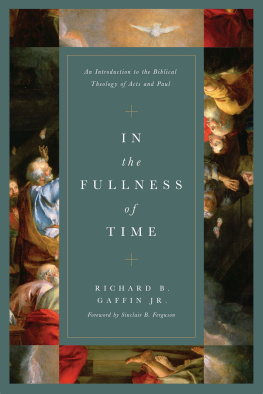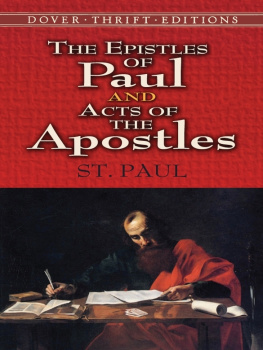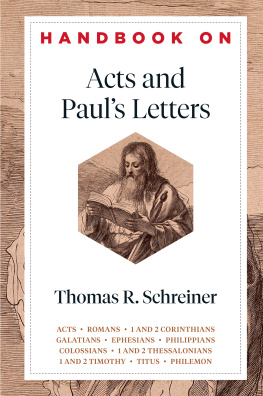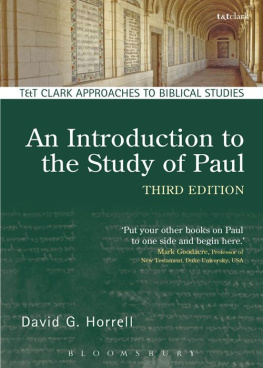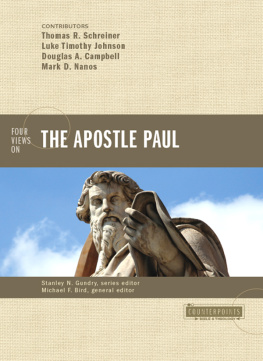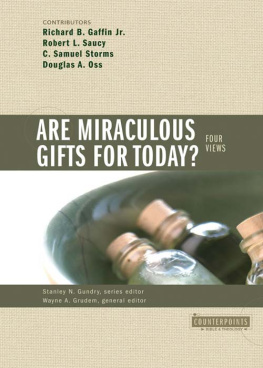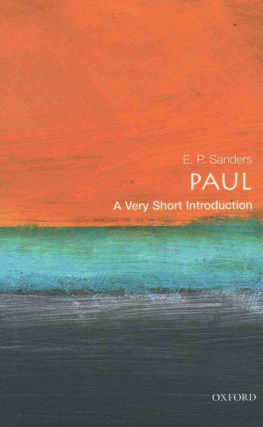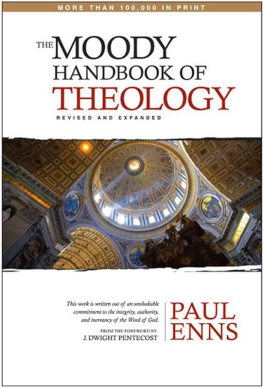Table of Contents
Landmarks
The Spirit and the Kingdom in Lukes Gospel: An Initial Overview
For our treatment of Acts and the significance of Pentecost, it will be useful to take note briefly of those passages in part 1 to Theophilus where a connection or correlation is made between the Holy Spirit and the kingdom.
Luke 1:3235
He will be great and will be called the Son of the Most High. And the Lord God will give to him the throne of his father David, and he will reign over the house of Jacob forever, and of his kingdom there will be no end. And Mary said to the angel, How will this be, since I am a virgin? And the angel answered her, The Holy Spirit will come upon you, and the power of the Most High will overshadow you; therefore the child to be born will be called holythe Son of God.
This passage, part of the interchange between Gabriel and Mary (1:2638), concerns the son he has told her she will bear and is to name Jesus (1:31), and who will also be called the Son of the Most High.
On the one hand, notice now how pronounced kingdom language is in what is said here about the Son. The Lord God will give him the throne of his father David (1:32); correlatively, he will reign [] over the house of Jacob forever (1:33a); climactically and with specific reference to the kingdom, of his kingdom there will be no end (1:33b).
Further, in response to Marys wondering question concerning the realization of these kingdom-laden promises, the angel declares concerning the paternity of the royal child who she is to bear that the Holy Spirit, as the power of the Most High, will come upon and overshadow her (1:35). So, already from the time of his conception, there is a bond between Jesus and the Holy Spirit essential for the coming of the kingdom. Dating from his conception, Jesus , the Holy Spirit, and the coming kingdom are inseparable.
Luke 3:2122
Now when all the people were baptized, and when Jesus also had been baptized and was praying, the heavens were opened, and the Holy Spirit descended on him in bodily form, like a dove; and a voice came from heaven, You are my beloved Son; with you I am well pleased.
This account of the baptism of Jesus by John will occupy us below in greater detail. Here, our interest is to note the connection between the Holy Spirit and the kingdom.
Anticipating what I will discuss more fully later on, the voice from heaven declares approval of Jesus in his identity as the
This coming of the Spirit on Christ is not merely symbolic, butsymbolized, to be sure, by the dovethe Holy Spirit comes upon him as genuine endowment. Clearly this endowment is for the messianic task that faces him. The Holy Spirit is the equipping that Jesus receives for the kingdom commission ahead of him.
This endowment, it should not be missed, is not merely formal but necessary in view of the needs of the human nature the Son has assumed. All told, we may say that what takes place at the Jordan is the kingdom-coronation of Jesus . Here, Jesus is marked out publicly as its Spirit-anointed King.
Luke 4:113
In Luke 4:1). With the role of the Holy Spirit accented in this way, Jesus enters the desert setting of the temptation.
From what ensues, Jesus , Spirit-endowed and controlled, is drawn into a struggle that, in its largest dimensions, is between the kingdom of God and the kingdom of Satan. Clearly at issue in each of the three temptations is kingdom and kingship. In the second, the devil promises all the kingdoms of the world if Jesus will worship him (4:58). Similarly, in light of what has previously taken place at the Jordan, in the first and third temptations, the devil seeks to undermine the messianic-kingdom identity and appointment of Jesus as the Son of God (4:3, 9).
All told, what took place in the desert was the effort on Satans part to challenge Jesus in his messianic mission, to get him to abandon his commitment to the kingdom of God. The force of the temptation in each instance was to elicit from Jesus an act of messianic treason, as we might put it, and so in that way to derail the kingdom program with its messianic calling that lay before him.
In passing here but no less importantly, we need to appreciate the uniqueness of this temptation, its redemptive-historical ( historia salutis ) significance. There are, surely, lessons to be learned from this passage for our own lives regarding how to resist temptation, particularly Jesus s recourse to Scripture, his being ready with an answer from Scripture. But what must not be missed here is what is discontinuous with our temptation, its uniquely messianic dimension.
That discontinuity is highlighted by the reference to the action of the Holy Spirit. Jesus teaches his disciples to pray, And lead us not into temptation (Luke 11:4; cf. Matt. 6:13). But here, and pointedly, Jesus himself is led by the Spirit into temptation, temptation that unfolds with its singular messianic aspects.
Luke 4:1444
This lengthy passage describes the Galilean ministry in its opening phases. According to the introductory summary verses (4:1415), throughout this period Jesus s teaching in synagogues was in the power of the Spirit. More specifically and no doubt harkening back to what took place at his baptism, The Spirit of the Lord is upon me, / because he has anointed me / to proclaim good news to the poor (4:18).
Further, from many indications, some already noted earlier, this Spirit-anointed and -empowered gospel proclamation is described in its fullness as the good news of the kingdom of God (4:43; cf. 16:16); it is the gospel that has the kingdom, and particularly the kingdom as a present reality as its subject matter.
Luke 11:20
This is the Lucan parallel to Matthew 12:28, looked at above as the clearest and most emphatic assertion of the kingdom as present in the earthly ministry of Jesus : But if it is by the finger of God that I cast out demons, then the kingdom of God has come upon you. Where Matthew has Spirit, Luke has finger. The latter, particularly considering Lukes usage elsewhere, is a graphic way of picturing the Spirit in his working. For instance, elsewhere in Luke-Acts, similar reference is made to the hand of the Lord (e.g., Acts 4:30; 11:21; 13:11). In view in these occurrences, seen in their contexts, is the activity of God, his power either for salvation or in judgment, activity associated specifically with the Spirit. So here, too, a connection between the Holy Spirit and the kingdom is clear.
Luke 11:13 and 12:32
If you then, who are evil, know how to give good gifts to your children, how much more will the heavenly Father give the Holy Spirit to those who ask him!
Fear not, little flock, for it is your Fathers good pleasure to give you the kingdom.
What disposes drawing these two statements together is what they have in common in their respective contexts: the needs of the disciples and the Fathers concernthe concern of God in his identity as Fatherto meet those needs. In 12:32, the greatest blessing that the disciples are to seek (12:31) and that the Father wills to give is the kingdom, while in 11:13 the incomparably highest gift the Father will give to those who ask is the Holy Spirit.
Bringing these two verses together points to a close correlation between the Holy Spirit and the kingdom that amounts to a virtual identification. The Holy Spirit and the kingdom are alternative ways of describing the ultimate blessing, the highest beatitude that the Father has to give. The Holy Spirit and kingdom are two descriptions of that blessing inclusive of all other blessings. Further confirmation for taking these two verses together is that they are the only two places in Luke where Jesus speaks of the Fathers purpose or will to give.
This correlation reinforces that the Spirit in the ministry of Jesus and as ministered by him is the inherent power of the kingdom. Also, the reference to the Father anticipates and provides background for the description of the Spirit come on the day of Pentecost as the promise of [the] Father (Luke 24:49; Acts 1:4). The promise in these two verses, taken together, is for the coming of the Holy Spirit and the kingdom in the future, a promise, as our subsequent discussion will show, that is fulfilled on Pentecost.

